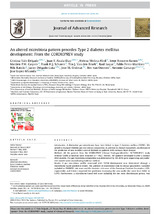Mostrar el registro sencillo del ítem
An altered microbiota pattern precedes Type 2 diabetes mellitus development: From the CORDIOPREV study
| dc.contributor.author | Vals-Delgado, Cristina | |
| dc.contributor.author | Alcalá-Diaz, Juan F. | |
| dc.contributor.author | Molina-Abril, Helena | |
| dc.contributor.author | Roncero-Ramos, Irene | |
| dc.contributor.author | Caspers, Martien P.M. | |
| dc.contributor.author | Schuren, Frank H.J. | |
| dc.contributor.author | Broek, Tim J. Van den | |
| dc.contributor.author | Luque, Raúl M. | |
| dc.contributor.author | Pérez-Martínez, Pablo | |
| dc.contributor.author | Katsiki, Niki | |
| dc.contributor.author | Delgado-Lista, Javier | |
| dc.contributor.author | Ordovas, José M. | |
| dc.contributor.author | Ommene, Ben van | |
| dc.contributor.author | Camargo García, A. | |
| dc.contributor.author | López-Miranda, José | |
| dc.date.accessioned | 2021-11-16T09:47:01Z | |
| dc.date.available | 2021-11-16T09:47:01Z | |
| dc.date.issued | 2021 | |
| dc.identifier.uri | http://hdl.handle.net/10396/22115 | |
| dc.description.abstract | Introduction. A distinctive gut microbiome have been linked to type 2 diabetes mellitus (T2DM). We aimed to evaluate whether gut microbiota composition, in addition to clinical biomarkers, could improve the prediction of new incident cases of diabetes in patients with coronary heart disease. Methods All the patients from the CORDIOPREV (Clinical Trials.gov.Identifier: NCT00924937) study without T2DM at baseline were included (n = 462). Overall, 107 patients developed it after a median of 60 months. The gut microbiota composition was determined by 16S rRNA gene sequencing and predictive models were created using hold-out method. Results. A gut microbiota profile associated with T2DM development was determined through a microbiome-based predictive model. The addition of microbiome data to clinical parameters (variables included in FINDRISC risk score and the diabetes risk score of the American Diabetes Association, HDL, triglycerides and HbA1c) improved the prediction increasing the area under the curve from 0.632 to 0.946. Furthermore, a microbiome-based risk score including the ten most discriminant genera, was associated with the probability of develop T2DM. Conclusión. These results suggest that a microbiota profile is associated to the T2DM development. An integrate predictive model of microbiome and clinical data that can improve the prediction of T2DM is also proposed, if is validated in independent populations to prevent this disease. | es_ES |
| dc.format.mimetype | application/pdf | es_ES |
| dc.language.iso | eng | es_ES |
| dc.publisher | Elsevier | es_ES |
| dc.rights | https://creativecommons.org/licenses/by-nc-nd/4.0/ | es_ES |
| dc.source | Vals-Delgado, C., Alcala-Diaz, J. F., Molina-Abril, H., Roncero-Ramos, I., Caspers, M. P., Schuren, F. H., Van Den Broek, T. J., Luque, R., Perez-Martinez, P., Katsiki, N., Delgado-Lista, J., Ordovas, J. M., Van Ommen, B., Camargo, A., & Lopez-Miranda, J. (2022). An altered microbiota pattern precedes Type 2 diabetes mellitus development: From the CORDIOPREV study. Journal Of Advanced Research, 35, 99-108. https://doi.org/10.1016/j.jare.2021.05.001 | es_ES |
| dc.subject | Intestinal microbiota | es_ES |
| dc.subject | Type 2 diabetes mellitus | es_ES |
| dc.subject | Predictive model | es_ES |
| dc.subject | Coronary heart disease | es_ES |
| dc.subject | CORDIOPREV | es_ES |
| dc.title | An altered microbiota pattern precedes Type 2 diabetes mellitus development: From the CORDIOPREV study | es_ES |
| dc.type | info:eu-repo/semantics/article | es_ES |
| dc.relation.publisherversion | https://doi.org/10.1016/j.jare.2021.05.001 | es_ES |
| dc.relation.projectID | Gobierno de España. PIE14/00005 | es_ES |
| dc.relation.projectID | Gobierno de España. PIE14/00031 | es_ES |
| dc.relation.projectID | Gobierno de España. AGL2012/39615 | es_ES |
| dc.relation.projectID | Gobierno de España. AGL2015-67896-P | es_ES |
| dc.relation.projectID | Gobierno de España. PI13/00023 | es_ES |
| dc.relation.projectID | Gobierno de España. PI16/01777 | es_ES |
| dc.relation.projectID | Gobierno de España. PI19/00299 | es_ES |
| dc.relation.projectID | Gobierno de España. DTS19/00007 | es_ES |
| dc.relation.projectID | Gobierno de España. CP14/00114 | es_ES |
| dc.relation.projectID | Junta de Andalucía. CVI-7450 | es_ES |
| dc.rights.accessRights | info:eu-repo/semantics/openAccess | es_ES |

